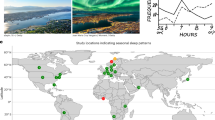Abstract
Sleep has received limited attention in economics and sleep duration is usually made exogenous and fixed in models of time allocation. In our framework sleeping involves investing in alertness but also a sacrifice of waking time. We show how the inter-temporal utility-maximization problem on the length of sleep is analogous to the optimality conditions for resource extraction. We then test the theoretical predictions that emerge from the model, which include the effects of labor market opportunities and having children, on sleep patterns.
Similar content being viewed by others
Notes
The second-order condition is \( - 2a_{{t_{s} }} + \left( {T - t_{s} } \right)a_{{t_{s} t_{s} }}\, <\,0 \).
The second-order condition is satisfied; \( - 2t_{s} < 0 \).
References
Aeschbach D, Sher L, Postolache TT, Matthews JR, Jackson MA, Wehr TA (2003) A longer biological night in long sleepers than in short sleepers. J Clin Endocrinol Metab 88(1):26–30. doi:10.1210/jc.2002-020827
Asgeirsdottir TL, Zoega G (2011) On the economics of sleeping. Mind Soc 10(2):149–164. doi:10.1007/s11299-011-0086-5
Asgeirsdottir TL, Corman H, Noonan K, Olafsdottir P, Reichman NE (2014) Was the economic crisis of 2008 good for Icelanders? Impact on health behaviors. Econ Hum Biol 13:1–19. doi:10.1016/j.ehb.2013.03.005
Becker Gary S (1964) Human capital. Columbia University Press for the National Bureau of Economic Research, New York
Biddle J, Hamermesh D (1990) Sleep and the allocation of time. J Polit Econ 98(5):922–943. doi:10.1086/261713
Brochu P, Armstrong CD, Morin L-P (2012) The “trendiness” of sleep: an empirical investigation into the cyclical nature of sleep time. Empir Econ 43(2):891–913. doi:10.1007/s00181-011-0508-6
Bryan ML (2011) Measuring work: prospects for labour market research. In: McFall SL, Garrington C (eds) Early findings from the first wave of the UK’s household longitudinal study. University of Essex, Colchester
Chatzitheochari S, Arber S (2009) Lack of sleep, work and the long hours culture: evidence from the UK time use survey. Work Employ Soc 23(1):30–48. doi:10.1177/0950017008099776
Ellenbogen JM (2005) Cognitive benefits of sleep and their loss due to sleep deprivation. Neurology 64(7):E25–E27
Gildner TE, Liebert MA, Kowal P, Chatterji S, Snodgrass JJ (2014) Associations between sleep duration, sleep quality, and cognitive test performance among older adults from six middle income countries: results from the study on global ageing and adult health (SAGE). J Clin Sleep Med 10(6):613–621. doi:10.5664/jcsm.3782
Grandner MA, Kripke DF (2004) Self-reported sleep complaints with long and short sleep: a nationally representative sample. Psychosom Med 66(2):239–241. doi:10.1097/01.PSY.0000107881.53228.4D
Groeger JA, Zijlstra FRH, Dijk DJ (2004) Sleep quantity, sleep difficulties and their perceived consequences in a representative sample of some 2000 British adults. J Sleep Res 13(4):359–371. doi:10.1111/j.1365-2869.2004.00418.x
Grossman M (1972) On the concept of health capital and the demand for health. J Polit Econ 80(2):223–255
Gudlaugsson JO, Magnusson KT, Jonsson SH (2014) Heilsa og líðan Íslendinga 2012: Framkvæmdaskýrsla (Health and Wellbeing of Icelanders 2012. Project Report). Reykjavík: Directorate of Health
Hale L (2005) Who has time to sleep? J Public Health 27(2):205–211. doi:10.1093/pubmed/fdi004
Hotelling H (1931) The economics of exhaustible resources. J Polit Econ 39(2):137–175
Jean-Louis G, Kripke DF, Ancoli-Israel S, Klauber MR, Sepulveda RS (2000) Sleep duration, illumination, and activity patterns in a population sample: effects of gender and ethnicity. Biol Psychiatry 47(10):921–927. doi:10.1016/S0006-3223(99)00169-9
Kaneita Y, Uchiyama M, Takemura S, Yokoyama E, Miyake T, Harano S, Asai T, Ohida T (2007) Use of alcohol and hypnotic medication as aids to sleep among the Japanese general population. Sleep Med 8(7–8):723–732. doi:10.1016/j.sleep.2006.10.009
Knutson KL, Van Cauter E, Rathouz PJ, DeLeire T, Lauderdale DS (2010) Trends in the prevalence of short sleepers in the USA: 1975–2006. Sleep 33(1):37–45
Kripke DF, Brunner R, Freeman R, Hendrix SL, Jackson RD, Masaki K, Carter RA (2001) Sleep complaints of postmenopausal women. Clin J Women’s Health 1(5):244–252. doi:10.1053/cjwh.2001.30491
Kronholm E, Harma M, Hublin C, Aro AR, Partonen T (2006) Self-reported sleep duration in Finnish general population. J Sleep Res 15(3):276–290. doi:10.1111/j.1365-2869.2006.00543.x
Krueger PM, Friedman EM (2009) Sleep duration in the United States: a cross-sectional population-based study. Am J Epidemiol 169(9):1052–1063. doi:10.1093/aje/kwp023
Meadows R, Arber S, Venn S, Hislop J (2008) Engaging with sleep: male definitions, understandings and attitudes. Sociol Health Illn 30(5):696–710. doi:10.1111/j.1467-9566.2008.01088.x
Ohayon MM (2009) Difficulty in resuming or inability to resume sleep and the links to daytime impairment: definition, prevalence and comorbidity. J Psychiatr Res 43(10):934–940. doi:10.1016/j.jpsychires.2009.01.011
Pace-Schott EF, Spencer RMC (2011) Age-related changes in the cognitive function of sleep. Prog Brain Res 191:75–89. doi:10.1016/B978-0-444-53752-2.00012-6
Patel SR, Malhotra A, Gottlieb DJ, White DP, Hu FB (2006) Correlates of long sleep duration. Sleep 29(7):881–889
Statistics Iceland (2014) Price index. <http://www.statice.is/Statistics/Prices-and-consumption/Consumer-price-index>. Accessed 26 June 2014
Statistics Iceland (2014) Real wage index. <http://www.statice.is/Statistics/Wages,-income-and-labour-market/Wage-index>. Accessed 10 July 2014)
Stranges S, Dorn JM, Shipley MJ, Kandala N-B, Trevisan M, Miller MA, Farinaro E, Cappuccio FP (2008) Correlates of short and long sleep duration: a cross-cultural comparison between the United Kingdom and the United States The Whitehall II study and the western New York health study. Am J Epidemiol 168(12):1353–1364. doi:10.1093/aje/kwn337
Szalontai G (2006) The demand for sleep: a South African study. Econ Model 23(5):854–874. doi:10.1016/j.econmod.2005.10.011
Turner TH, Salamat JS, Drummond SPA, Brown GG (2007) Effects of 42 Hr of total sleep deprivation on component processes of verbal working memory. Neuropsychology 21(6):787–795. doi:10.1037/0894-4105.21.6.787
Van Dongen HPA, Maislin G, Mullington JM, Dinges DF (2003) The cumulative cost of additional wakefulness: dose–response effects on neurobehavioral functions and sleep physiology from chronic sleep restriction and total sleep deprivation. Sleep 26(2):117–126
Van Dongen HPA, Vitellaro KM, Dinges DF (2005) Individual differences in adult human sleep and wakefulness: leitmotif for a research agenda. Sleep 28(4):479–496
Venn S, Arber S (2011) Day-time sleep and active ageing in later life. Ageing Soc 31(2):197–216
Webb W (1985) Sleep in industrialized settings in the northern hemisphere. Psychol Rep 57(2):591–598
Wyatt JK, Ritz-De Cecco A, Czeisler CA, Dijk DJ (1999) Circadian temperature and melatonin rhythms, sleep, and neurobehavioral function in humans living on a 20-h day. Am J Physiol Regul Integr Comp Physiol 277(4):R1152–R1163
Acknowledgments
This work was supported by the Icelandic Research Fund (IRF—Grant Number 130611-052) and the University of Iceland Research Fund. We thank the Directorate of Health in Iceland for data provision.
Author information
Authors and Affiliations
Corresponding author
Electronic supplementary material
Below is the link to the electronic supplementary material.
Rights and permissions
About this article
Cite this article
Ásgeirsdóttir, T.L., Ólafsson, S.P. & Zoega, G. Sleep and the management of alertness. Mind Soc 15, 169–189 (2016). https://doi.org/10.1007/s11299-015-0182-z
Received:
Accepted:
Published:
Issue Date:
DOI: https://doi.org/10.1007/s11299-015-0182-z




